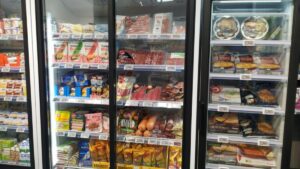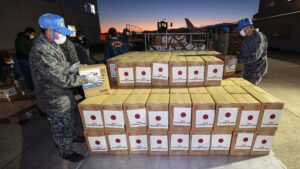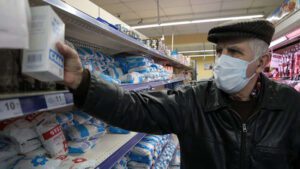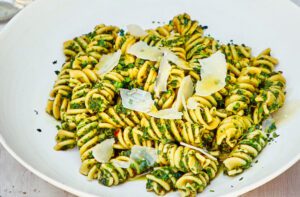
The State Service for Food Safety and Consumer Protection has started to monitor prices daily for a number of socially important food products, medical products and fuel, according to the website of the Cabinet of Ministers of Ukraine on Wednesday.
“State supervision (control) during martial law in Ukraine will be carried out only to curb the rise in prices for socially significant products, guaranteeing their availability to the population and in the presence of a threat that has a significant negative impact on the rights, legitimate interests, life and health of a person,” the government said.
The list of food products for monitoring includes wheat flour, pasta, loaf, bread, buckwheat and oatmeal, pork, beef, poultry (chicken carcasses), milk, butter and sunflower oil, sour cream, chicken eggs, crystalline sugar, white cabbage, onions, beets, carrots, potatoes.
From non-food products, the list includes 96% ethanol, anti-inflammatory and antibacterial drugs, A-92 and A-95 gasoline, diesel fuel, liquefied gas for cars.
The Cabinet of Ministers in resolution No. 303 of March 13 stopped conducting state control and market supervision of prices for these goods, introduced in January of this year, however, the State Service for Food Safety and Consumer Protection took up daily monitoring of prices for them from March 22.
“According to the data provided by the monitoring, since March 14, logistics has been established in many enterprises in almost all regions of Ukraine, which improved the situation with the assortment of goods, and also made it possible to reduce prices for the grocery group of goods, bakery products, some dairy clear products, as well as fuel,” the government said in a statement.
In addition, the State Service for Food Safety and Consumer Protection called on businesses to prevent unreasonable price increases for goods with significant social significance for the population during martial law in Ukraine.

The Japanese Self-Defense Force has sent bullet-proof vests and other non-lethal supplies in response to a request from Ukraine, NHK TV channel has reported.
The KC-767 transport aircraft left the Komaki Air Base in Aichi Prefecture, central Japan, on Tuesday night for Poland, which shares a border with Ukraine. The items also include heavy winter clothes and emergency food supplies.
This is the first time the SDF has provided bullet-proof vests to another country.
According to the Ministry of Defense, Japan plans to deliver more equipment and supplies to Ukraine once they are ready, such as food, hygiene products, cameras, power generators, tents and winter clothing.
At a press conference on Tuesday, Chief Cabinet Secretary Hirokazu Matsuno said it was “critical” for Japan and its national security to support Ukraine.

Prime Minister Denys Shmyhal says the government is actively developing mechanisms for stable supplies of food, medicine and essential goods throughout the country.
“Now the government is actively developing mechanisms for stable supplies of food, medicine and essential goods throughout the country,” Shmyhal said in a video message on Wednesday afternoon.
According to the prime minister, at the moment the Coordinating Center for the Provision of Food Products, Medicines, Drinking Water and Fuel is operating under the leadership of First Deputy Prime Minister and Minister of Economy Yulia Svyrydenko, and the Humanitarian Aid Coordination Center is also operating under the leadership of Deputy Prime Minister for European and Euro-Atlantic Integration Olha Stefanishina.

Imports of food and beverages from Italy in January-August 2021 reached EUR 138.15 million, which is 15.4% more than in the same period last year, representatives of the Italian Trade Agency (ITA) told Interfax-Ukraine on the sidelines of the VI Italian Cuisine Week held in Kyiv.
“According to the Italian National Institute of Statistics (Istat), in 2020, imports of Italian food products to Ukraine, including drinks, grew by 26.5%, or to EUR 208 million compared to 2019. Food products now account for 12.3% of total import of Italian goods,” ITA Kyiv Office Manager Tony Corradini said.
According to the data presented by ITA, last year’s indicator is almost 2.3 times higher than the 2013 indicator and 3.8 times higher than in 2015, when a local minimum of food imports was recorded, after which it is growing continuously.
According to Corradini, Italian pasta occupies 55% of the Ukrainian market, wine over 30%. Italy is also the largest exporter of extra-virgin olive oil to Ukraine.
According to statistics, the main growth in imports of food from Italy to Ukraine this year was provided by dairy products (a rise of 39.4%, to EUR 9.95 million), pasta and bakery products (a rise of 11.6%, to EUR 16.64 million), sparkling wine, other special wines, distilled and mixed alcoholic beverages (a rise of 52.9%, to EUR 24.04 million), and wine (a rise of 17.4%, to EUR 15.05 million).
In addition to holding the new Italian cuisine week, the Italian Embassy in Ukraine and ITA, as part of the promotion of authentic Italian products, also signed a cooperation agreement with the second largest Ukrainian supermarket chain Silpo.
“Thanks to this agreement, Ukrainians will be able to buy real, high-quality Italian products, and we, in turn, will raise awareness of Italian culture and fight against such a phenomenon as “Italian ring” [when only the name of the product is Italian],” Italian Ambassador to Ukraine Pier Francesco Zadzo said.
Under the agreement, the Silpo chain, represented by 320 stores in 80 cities, will promote both existing and new Italian brands and goods to Ukrainians, as well as further develop the Positano restaurant, which is part of the Fozzy Group, Head of the Own Import Department Svitlana Schehrykovych said.

The Ministry of Agrarian Policy and Food of Ukraine held a number of meetings with representatives of the government and business of the Kingdom of Saudi Arabia, the parties agreed to develop a number of interstate agreements in the field of the agro-industrial complex, and also discussed investments in the Ukrainian agro-industrial complex, Minister of Agrarian Policy Roman Leschenko said on Facebook.According to him, Ukraine and Saudi Arabia agreed to develop a comprehensive framework agreement between the countries in the field of agriculture, to diversify sources of supplies of phosphate fertilizers to Ukraine, to increase support from Saudi Arabia for processing Ukrainian agricultural products and implement investment projects for processing and logistics of agricultural products.The agency also discussed with the Arabian company Ajlan & Bros Holding Group the possibility of investing in the production of agricultural products in Ukraine, with Almarai – growing alfalfa for its supply to v Saudi Arabia, with the Saudi Fund for Development – the issues of financial support for irrigation projects, with ARASCO – increasing the volume of grain purchases in Ukraine, with Saudi EXIM Bank – financing the agricultural sector of Ukraine.“One of the key tasks in the near future is to bring the negotiation process to a successful conclusion. We are continuing the dialogue, strengthening trade and investment cooperation with Ukraine’s strategic partner in the agricultural sector,” the minister summed up.As reported, the Ministry of Agrarian Policy and the Arabian manufacturer of irrigation equipment Alkhorayef Group on November 27 signed a memorandum allowing the possibility of starting its production in Ukraine . According to the ministry, Alkhorayef Industries is the third largest manufacturer of irrigation machines in the world and the first in the Arabian Peninsula. Its activities are spread in 40 countries of the world, they produce industrial, agricultural and irrigation equipment.